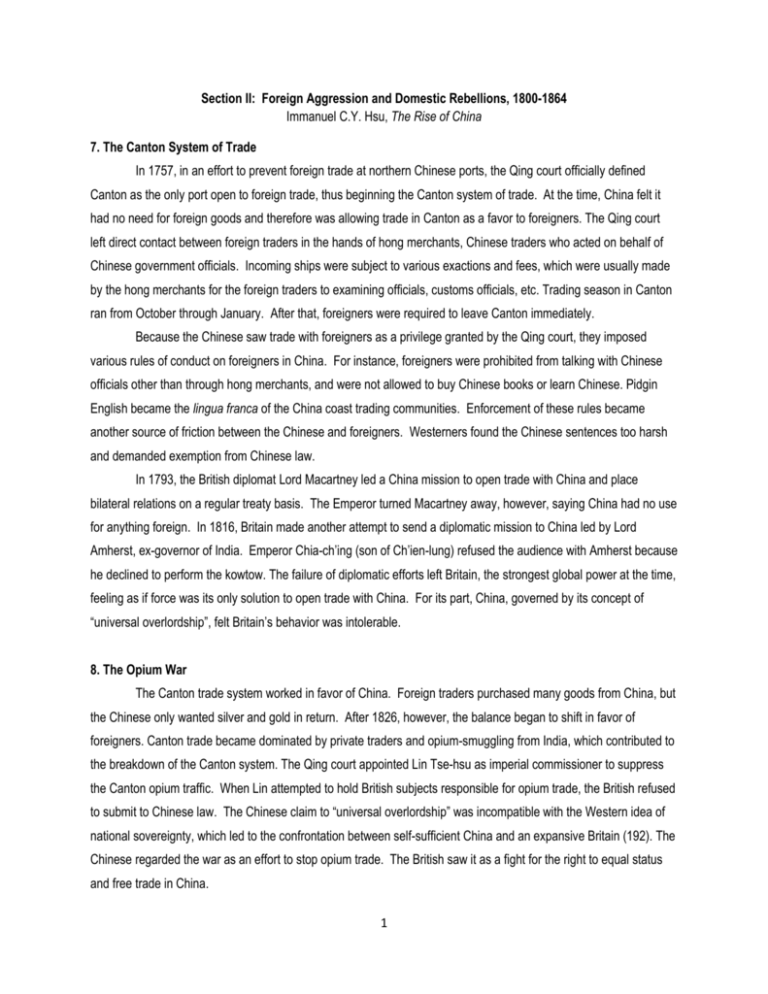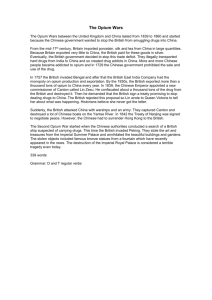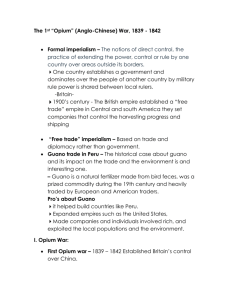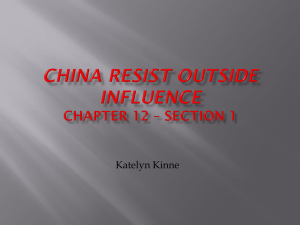Section II: Foreign Aggression and Domestic Rebellions, 1800
advertisement

Section II: Foreign Aggression and Domestic Rebellions, 1800-1864 Immanuel C.Y. Hsu, The Rise of China 7. The Canton System of Trade In 1757, in an effort to prevent foreign trade at northern Chinese ports, the Qing court officially defined Canton as the only port open to foreign trade, thus beginning the Canton system of trade. At the time, China felt it had no need for foreign goods and therefore was allowing trade in Canton as a favor to foreigners. The Qing court left direct contact between foreign traders in the hands of hong merchants, Chinese traders who acted on behalf of Chinese government officials. Incoming ships were subject to various exactions and fees, which were usually made by the hong merchants for the foreign traders to examining officials, customs officials, etc. Trading season in Canton ran from October through January. After that, foreigners were required to leave Canton immediately. Because the Chinese saw trade with foreigners as a privilege granted by the Qing court, they imposed various rules of conduct on foreigners in China. For instance, foreigners were prohibited from talking with Chinese officials other than through hong merchants, and were not allowed to buy Chinese books or learn Chinese. Pidgin English became the lingua franca of the China coast trading communities. Enforcement of these rules became another source of friction between the Chinese and foreigners. Westerners found the Chinese sentences too harsh and demanded exemption from Chinese law. In 1793, the British diplomat Lord Macartney led a China mission to open trade with China and place bilateral relations on a regular treaty basis. The Emperor turned Macartney away, however, saying China had no use for anything foreign. In 1816, Britain made another attempt to send a diplomatic mission to China led by Lord Amherst, ex-governor of India. Emperor Chia-ch’ing (son of Ch’ien-lung) refused the audience with Amherst because he declined to perform the kowtow. The failure of diplomatic efforts left Britain, the strongest global power at the time, feeling as if force was its only solution to open trade with China. For its part, China, governed by its concept of “universal overlordship”, felt Britain’s behavior was intolerable. 8. The Opium War The Canton trade system worked in favor of China. Foreign traders purchased many goods from China, but the Chinese only wanted silver and gold in return. After 1826, however, the balance began to shift in favor of foreigners. Canton trade became dominated by private traders and opium-smuggling from India, which contributed to the breakdown of the Canton system. The Qing court appointed Lin Tse-hsu as imperial commissioner to suppress the Canton opium traffic. When Lin attempted to hold British subjects responsible for opium trade, the British refused to submit to Chinese law. The Chinese claim to “universal overlordship” was incompatible with the Western idea of national sovereignty, which led to the confrontation between self-sufficient China and an expansive Britain (192). The Chinese regarded the war as an effort to stop opium trade. The British saw it as a fight for the right to equal status and free trade in China. 1 According to Hsu, there were three stages of the Opium War: 1) June 1840-January 1841: British forced the Chinese to draft a “Ch’uan-pi Convention” to reopen Canton and force cession of Hong Kong; 2) February-May 1841: the Ch’uan-pi Convention was repudiated by the emperor and the throne, and replaced with a second truce that agreed to the withdrawal of Chinese troops from Canton within six days and the postponement of the question of the cession of Hong Kong. Angered by the agreement, irate Cantonese launched a sudden attack on the British; and, 3) August 1841-August 1842: The British forced the Chinese to sign the Treaty of Nanjing. No mention of opium was made in the treaties. 9. Second Treaty Settlement After the Opium War, the five ports accessible to Britain opened on schedule, except for Canton. The latter refused entry of foreigners, arguing that the Treaty of Nanjing did not stipulate that foreigners be allowed into the city. In 1846, not wanting a clash over the “Canton city question,” the British agreed to postpone entry into Canton in exchange for a promise of non-alienation of the Chusan Islands to any other power. By 1848, new Chinese antiforeign officials took power in Beijing. Meanwhile, foreign desire to revise the Treaty of Nanjing intensified. SinoBritish relations worsened. During the Arrow Incident of 1856, Chinese officials seized the Hong Kong-registered ship Arrow sparking the Second Opium War. The British and French defeated the Chinese in two separate campaigns. The first involved the capture of Canton and Tianjin, which led to the Treaty of Tientsin of 1858. The treaty focused on diplomatic representation in Peking, trade along the Yangtze, inland travel, and indemnity. The second campaign led to the fall of Beijing and the burning of the Summer Palace by the British. The war greatly expanded foreign trading rights and territorial concessions in China. 10. The Taiping Revolution and the Nien and Moslem Rebellions The Qing court failed to adequately deal with the foreign intervention and internal strife, including China’s social and economic problems, military degradation, political corruption, population pressure, national calamities and an explosive situation in Kwang-tung that resulted in the outbreak of the Taiping Rebellion in the south. Consequently, Four different rebellions erupted in protest against the ruling power, including: Taiping Rebellion (1850-1864); Nien Rebellion (1851-1868); Moslem rebellion in Yunnan (1855-1873); and, the Tungan Rebellion (1862-1878). Despite the growth of the Taipings, the group faced internal dissension, and was ultimately defeated in 1864 by Tseng Kuo-fan and the Hunan Army. The legacy of the rebellion was multifold. Politically, it resulted in the transfer of government power from the Manchus to the Chinese. Militarily, the Hunan and Huai armies were the forerunners of private armies that characterized the warlords of later periods. Finally, the Taipings inspired future revolutionaries, including Sun Yat-sen, and offered a new view on the possibility of peasant revolution. 2





